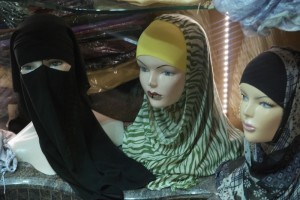Heated Debate Over Niqab in Syria


SMN No. 6, July 22, 2010
The Syrian education ministry has decided to prevent Niqab-wearing women students from attending both public and private universities in the country.
This comes weeks after it sacked 1200 state school teachers for wearing veils that cover their entire faces (Social Media News No. 5)
Both decisions have sparked a heated debate over the internet with Syrian netizens questioning religious freedoms, the conservative nature of society and the role of the state in controlling people’s expression of their faiths.
On a forum dedicated to the students of Damascus university, most comments were against the new ban. “I am against this decision because it does not respect personal freedoms,” said one commentator. Another criticised the decision arguing that “there were a thousand matters that need to be solved by the ministry of higher education; matters related to students and their academic lives”.
The minister of higher education, Ghiath Barakat, reportedly said that the wearing of the Niqab contradicted “academic values and traditions”. Earlier, he asserted that the veil, which only reveals the wearer’s eyes, is a threat to “the secular nature of the teaching process.”
Syria is ruled by the secular Baath party. In recent years, Syrian officials have raised fears of the growing phenomenon of Islamisation in the country.
In a comment on the recent governmental decision, All4Syria.info, a Syrian news website, said that the ban was security-related. The site quoted “informed sources” as saying that the national security intelligence bureau made the decision.
In several countries, it is feared that extremists would use the Niqab to conceal their identity and carry out extremist attacks. The debate over the Niqab has taken global dimensions after France decided this year to ban it in public spaces. Other European countries are considering following suit.
Recently, a Syrian online forum group with Islamist affiliations launched a campaign in support of the teachers who were dismissed from their positions. The forum said in a statement that one of its aims was to promote the “Arabic and Islamic identity” of the Syrian society and “advance the spirit of citizenship among the youth based on the values of justice, freedom and tolerance.”
The group invited netizens to draw pictures and compose poetry for an “artistic and literary” competition that would hold veiled women in Syria in high esteem. The purpose of the competition was also to bolster the freedom of wearing the veil and the Niqab, which, the website said, was not an impediment to any women’s profession.
The forum issued an online petition demanding the education ministry to withdraw its Niqab ban. Most comments by visitors to the forum took defended the role of Islam in the country with some implicitly calling for Syria to become an Islamic state.
“For an Islamic Syria inwardly and outwardly,” wrote one commentator. Another said, “We are Syrian and our constitution is the Koran.”
